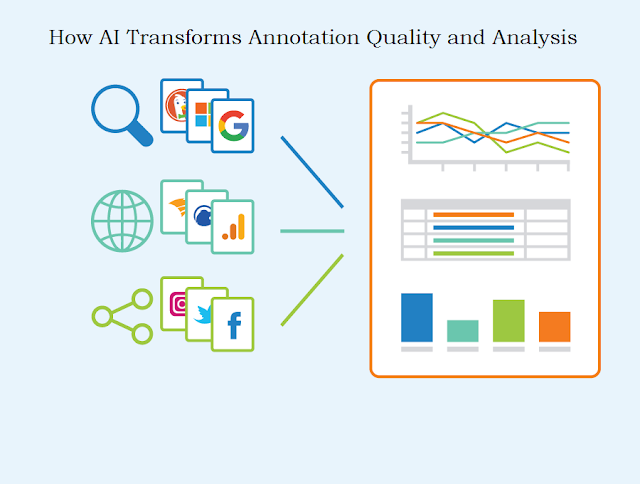Data is now the lifeblood of many industries in the digital age, fueling
innovations and influencing decision-making. Accurate and trustworthy
annotation is essential to releasing the full potential of data. Annotation is
the process of labeling data to add context and meaning so that machine
learning algorithms can spot patterns and draw accurate conclusions. This work
has typically been labor- and time-intensive, and prone to mistakes. A new era
of annotation quality and analysis has, however, arrived with the emergence of
artificial intelligence (AI), altering how humans interact with data.
The Basis of a High-Quality Annotation
Successful AI applications are built on top-notch annotation. The precision
of annotated data directly affects the effectiveness of machine learning
models, whether in image recognition, natural language processing, or any other
AI-driven application. Human annotation includes drawbacks like weariness,
consistency issues, and subjectivity. These issues may lower the data's overall
quality, which could result in less-than-ideal AI results. AI-powered
annotation has become possible as a result of the need for a more effective and
precise method.
AI-Powered Annotation: Unleashing Accuracy and Effectiveness
By bringing automation, accuracy, and scalability to the annotation
process, AI alters it. Algorithms for machine learning can be trained to spot
patterns and correctly categorize data points. By being exposed to enormous
datasets with human-annotated examples through supervised learning, AI models
may learn from existing examples and annotate new data points with astounding
accuracy. The quality of the annotations constantly rises above that of
conventional manual methods when the AI model is improved.
Annotation tools driven by AI can process enormous amounts of data in a
fraction of the time it would take a human annotator to do so. Organizations
can process more data thanks to this improved efficiency, which speeds up the
development and analysis of AI. Additionally, AI may iteratively update and
retrain models to keep them current and applicable in changing situations.
Reducing bias and human error
Humans can make mistakes and have biases that unintentionally lower the
quality of annotations. AI-driven annotation reduces these problems by
following dependable guidelines and ingrained habits. By ensuring that the
labeling process is objective and free from any subjective effects, the AI
model produces more trustworthy and impartial datasets.
This degree of objectivity is especially important in industries like
healthcare, banking, and autonomous cars where precision and objectivity are
critical. The output of an AI system is more credible and reliable when it uses
a consistent, objective approach to annotation.
Streamlining Workflows for Annotations
AI improves the quality of annotations while also streamlining the overall
annotation process. In a fraction of the time required by human annotators,
automated annotation technologies can process enormous amounts of data.
Organizations can process more data thanks to this improved efficiency, which
speeds up the development and analysis of AI.
Human annotators can concentrate on more intricate and subtle parts of data
analysis because AI is performing the majority of annotation chores. The
process of annotating data becomes more effective and efficient as a result of
the symbiotic relationship between AI and human annotators.
Complex Annotation Types Support
AI is capable of more than just simple text or image annotations. Complex
annotation tasks like object detection, semantic segmentation, sentiment
analysis, and others can be handled by advanced AI models. Because AI models
can annotate complicated data types, they can perform more advanced analysis
and grasp deeper insights, which produces more potent and precise predictions.
AI, for instance, can annotate and identify specific abnormalities or
tumors in medical imaging, assisting medical personnel in diagnosis and
treatment planning. AI can annotate and comprehend complicated traffic
scenarios in autonomous vehicles, making them safer and more effective.
Increasing Data Security and Privacy
In the age of AI, data security and privacy are major problems. Sensitive
data can be analyzed with AI-powered annotation without requiring direct human
access to the underlying data. In order to reduce the risk of data breaches or
unauthorized access to sensitive information, AI models can be developed on
encrypted data or deployed in safe environments.
Furthermore, the information utilized for annotation can be kept anonymous
and secure by using privacy-preserving design principles in AI systems. This
strategy fosters trust in data sharing, which is crucial in fields that depend
on data collaboration and aggregation.
Analyzing Intelligently: From Annotation
AI revolutionizes data analysis as well, not only annotation. Machine
learning algorithms can make more accurate predictions, spot trends, and glean
valuable insights from data with the help of high-quality annotated datasets.
The combination of AI-powered annotation and analysis offers up a world of
opportunities across numerous industries, from marketing and customer service
to healthcare and finance.
Early disease detection, individualized treatment regimens, and better
patient outcomes are all possible in healthcare thanks to AI-powered analysis
of annotated medical records. Artificial intelligence (AI) in marketing can
examine annotated customer data to generate tailored recommendations and
improve customer interaction.
AI's transformational impact on annotation quality and analysis is obvious
as it develops. AI improves the correctness and dependability of annotated data
by utilizing automation, precision, and objectivity, enabling machine learning
models to produce more reliable and insightful findings. Future developments in
AI-driven annotation hold the potential to revolutionize businesses and move
them toward more intelligent and data-driven decision-making. It is essential
to adopt AI in annotation and analysis if you want to maximize the value of
your data and promote innovation in the digital age. We can anticipate an
exciting future with limitless opportunities for enhancing lives and advancing
industries as AI and data analytics continue to advance together.










0 Comments